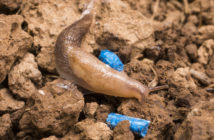Responding to the government announcement on future regulation of precision breeding techniques such as gene editing, following a three month consultation, NFU Vice President Tom Bradshaw said: “It is very encouraging to see the government’s view that new precision breeding techniques, such as gene editing, have the potential to offer huge benefits to UK farming,the environment and the public, and will be vital in helping us achieve our climate change net zero ambition.
“The world’s climate emergency points to the urgency of applying this technology to farming and this announcement is an important first step towards a properly functioning legislative system.
“These new tools could help in a number of ways, from addressing pest and disease pressures on crops and farm animals and improving animal health and welfare, to increasing farmers’ resilience in the event of extreme weather events such as flooding and drought and benefiting the environment through more efficient use of resources. This would mean lower emissions and less waste, allowing British farmers to farm more sustainably and profitably.
“Crucially, precision breeding technologies will also help in the development of foods with direct benefits to the public; better quality, increased nutritional value and products with a longer shelf life.
“We know gene editing is not a silver bullet. But if we are to make this a success, any new government regulation must be robust, fit for purpose and based on sound science. This will in turn provide public confidence, enable diverse and accessible innovation, and allow investment in products for the UK market.
“The NFU will be examining today’s announcement in detail and will work with Defra to ensure the right legislative system is in place, not only to drive research but also to provide a route to market for improved varieties and breeds. We also urge government to provide the necessary researchers and companies with a clear timetable. The government will also need to work closely with the devolved administrations to deliver something which works for the whole of the UK.
“British farming is innovative and ambitious and by seeking to use more sophisticated and targeted breeding tools for our crops and livestock, we can continue to produce sustainable, climate-friendly food well into the future.

Dr Tina Barsby
Welcoming the Government’s response to the consultation, Dr Tina Barsby, NIAB chief executive said: “Today’s announcement sends an important signal that Britain is adopting a more pro-science approach outside the EU, aligning our rules with other countries such as Japan, Canada, Argentina, Brazil and Australia, and boosting prospects for inward investment and international research collaboration given the UK’s strengths in genetic science.
“Innovation in plant breeding will be the single most important factor in helping global food supplies keep pace with a growing world population in the face of climate change and pressure on finite natural resources of land, water, energy and biodiversity.
“In terms of breeding objectives, there are virtually limitless possibilities to accelerate the development of more productive and sustainable food systems, with crops more resistant to diseases, environmental conditions and climate change effects, food products with improved nutritional qualities, and reduced need for agricultural inputs such as pesticides.
“For British farmers, virus yellows resistance in sugar beet is an obvious early target since the withdrawal of neonicotinoid seed dressings has left the crop vulnerable to massive yield losses. Here at NIAB we are also keen to explore the potential for gene editing to transform the performance of leguminous crops such as faba beans and soybeans under UK growing conditions. These are neglected crops in terms of breeding effort, and yet the economic, environmental and climate change opportunities presented by these break crops, as a Nitrogen-fixing source of home-grown, plant-based protein for human and livestock consumption, are hugely significant.”




